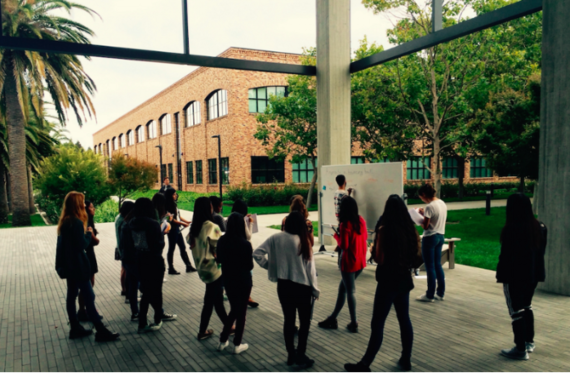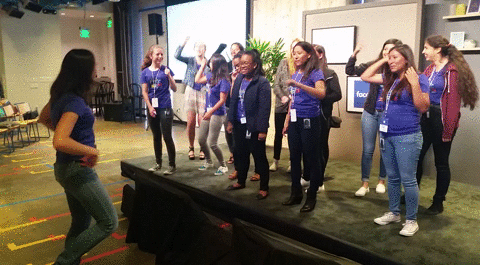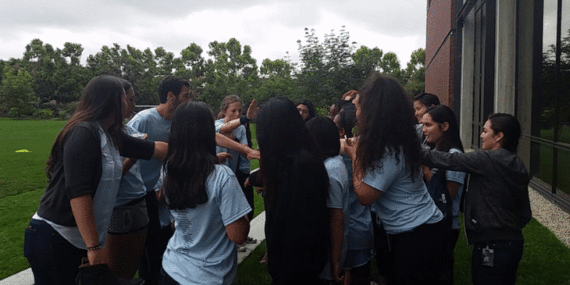By Jeff Stern
This week, we at Girls Who Code are celebrating the kick-off of our 2016 Summer Immersion Programs. More than 1,500 high school girls will spend seven weeks immersed in the tech world and learning computer science at 78 locations across the United States. This is especially important considering women make up half of our workforce, but only about 20% of all computer science occupations. And when 80% of our workrooms and teams are men, the resulting products unintentionally leave out a huge swath of the population like voice recognition technology that struggle to recognize female voices and a major "comprehensive health app" that didn't add period tracking until a year after release.
You may be nodding along with me, aware of and appalled by these problems too. But if all you are doing is sitting there and congratulating yourself on being a great champion for women -- well, that is not enough. I have learned as a Girls Who Code teacher that we must do much more than idly sit on the sidelines and cheer on our female peers. It is imperative for men to be active allies in the pursuit of gender equity.
Girls Who Code explicitly states their teaching opportunities welcome all genders, but I still remember during my first interview to be a Girls Who Code teacher, I asked point-blank "Will my students find it weird that I'm a guy who codes?"
They won't, I was told. And they didn't. What mattered more to my students, was not my gender, but the passion I had for teaching computer science and the enthusiasm I brought to the classroom. Throughout the summer, my students still saw women like them in the form of female mentors, guest speakers, and their incredible teaching assistants. My students, both summers I taught, learned several programming languages, developed leadership and confidence, and created some incredible things with code: a piano for deaf kids that lights up with each note, a tool for examining bias on Wikipedia pages, a game where a penguin chases a pancake to the north pole, just to name a few. I also watched She's The Man for the first time and somehow learned all the words to "We Are The World." So that's a win.
And together we learned something else -- the fight for gender equality in technology is not a "man vs. woman war". Everyone we encountered during the summer wanted to see these students succeed. By teaching them for seven weeks, I became at least one example of a male ally they have on their journey pursuing computer science. I hopefully won't be the only one, as at least one recent study has found that men overwhelmingly say they want and embrace gender equality in the workplace.
But just wanting something is not enough. Too many of us are sitting quietly on the sidelines, and I suspect many simply don't know how they can be helpful. Here are three ways to be an active ally for women in technology:
1. Listen to women -- I am, by every definition, a cis white male. I am occasionally guilty of man-spreading on the subway. I listen to Macklemore. And I have experienced immense privilege in part because of my gender, race, sexual orientation, and socioeconomic status. So no matter how many conversations I have with my female co-workers or students, I will never really know what it is like to be a woman in tech because I am not a woman in tech.
Yet by listening to my peers and asking questions, I have developed a richer understanding of the condescending, sexist bullshit that women put up with on a daily basis. If peers constantly questioned my abilities because of how I looked or dressed, I would probably be running for the door. I have heard too many stories from my colleagues about unkind behavior online ("Internet is convincing women not to study CS"), in classrooms ("Female CS major at Stanford floored by sexism"), and in the workplace ("Technology's man problem").
Julie Pagano has written a comprehensive guide on how to be a good listener. By listening, it has become clear that these women didn't just encounter a rare jerk but that our society has institutionalized behavior that is keeping women out of computer science positions.
2. Change the culture -- Recruiting girls to fill a positions won't work if the slipper doesn't fit, so break the slipper. Don't change the girl (they're more than capable of learning computer science), change the culture. Pay attention to and speak out against sexism and micro-aggressions in your workplace. Commit to only speak at conferences with a code of conduct or join panels where a woman will be present. Do you hire computer scientists? Eliminate whiteboard interviews and other tactics that routinely lead to bias and hire more women in tech. Are you a manager? Your actions have exponentially more weight. If you build a culture that actively encourages diverse opinions and viewpoints, good talent will find you.

I love whiteboards. I use them all the time to teach and think. But studies have routinely shown that using whiteboards in software engineering interviews lead to gender hiring bias in tech.
3. Join the movement --We could not have grown across the country without the support of Jags, Mark, Rahul, Sean, Terron, Tom, and the dozens of other men that teach for Girls Who Code. I am so grateful for our community of teachers, and I would love for you to bring a Girls Who Code Club to your neighborhood this fall. Or if not us -- check out Code2040, All Star Code, Black Girls Code or the countless other organizations that are making computer science education more equitable. One of the most satisfying experiences one can have is teaching others about something you love, empowering them to learn knowledge and skills that can change their future. I can't recommend it enough.
Between 2014 and 2015, the number of female AP Computer Science test takers rose from 20% to 22%. While Girls Who Code has already helped change the culture of technology during the past few years, we clearly still have a lot more work to do. Change demands not just quiet support, but the active participation of men and women, alike, to make computer science more welcoming to all.
And to the 1,500+ girls that will be in our summer programs: no matter who you have in your classroom, I assure you the Girls Who Code community your ally. They, like everyone else you meet this summer, will go to all lengths to ensure you succeed. We cannot wait to see what you code!
After teaching for two summers, I now work for Girls Who Code as Director of Learner Experience Design. We're working on some beautiful new projects and can't wait to share them with you. Sign up for our mailing list to be the first to see them!

